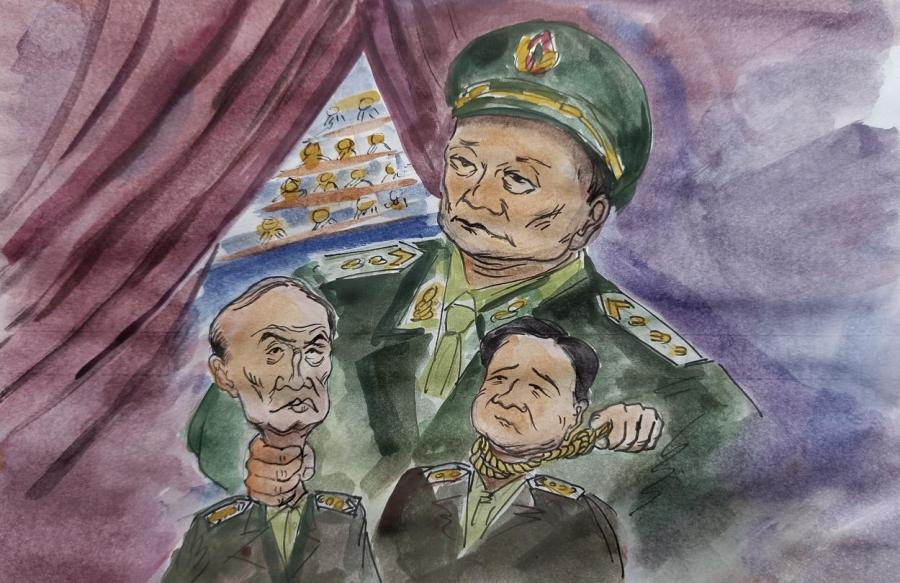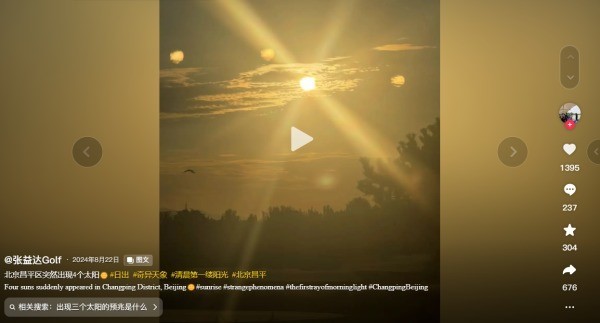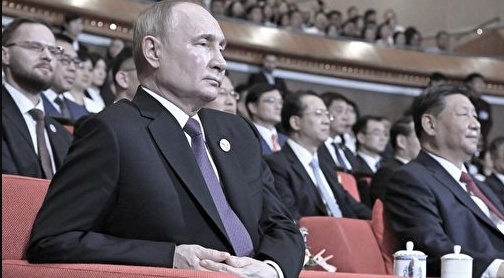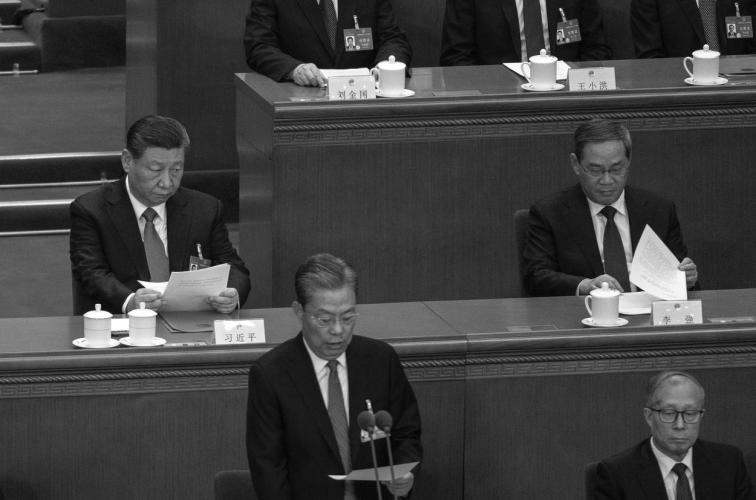Image: He Weidong, Zhao Keshi, and other Xi Jinping loyalists being purged by Zhang Youxia. (Qingyu / People News graphic)
[People News] According to CCP custom, every year before the Qingming Festival, senior Chinese Communist Party officials participate in ceremonial tree-planting events, and top military leaders are no exception. According to the PLA Daily and military news websites, on April 2, Zhang Youxia (member of the CCP Politburo and Vice Chairman of the Central Military Commission) and Yin Li (member of the CCP Politburo and Party Secretary of Beijing) participated in a voluntary tree-planting activity in a greenbelt area of Tongzhou District, Beijing. Also present were Central Military Commission (CMC) members Liu Zhenli and Zhang Shengmin. The report was titled: “Zhang Youxia and Yin Li Participate in Capital Voluntary Tree-Planting Activity.”
If we rewind time to April 1, 2024, a similar report appeared in the PLA Daily, but the headline then read: “Zhang Youxia, He Weidong, and Yin Li Participate in Capital Voluntary Tree-Planting Activity.” Besides Liu Zhenli and Zhang Shengmin, the former CMC Political Work Department Director Miao Hua, who has since been dismissed, also attended. In the April 7, 2023, report, the headline was again “Zhang Youxia, He Weidong, and Yin Li Participate in Capital Voluntary Tree-Planting Activity.” That year’s attendees included the same three as above, plus former Defense Minister Li Shangfu, who has also since been removed.
It is not difficult to see that this seemingly insignificant tree-planting news actually conveys significant information: every senior military official excluded from the current year’s tree-planting list has since encountered serious problems. This includes Li Shangfu, Miao Hua, and very likely He Weidong as well.
In fact, the Chinese military has not publicly denied that something has happened to He Weidong. On March 27, during a routine press conference, Defense Ministry spokesperson Wu Qian responded to questions by saying, “There is no information on this matter, and I’m not aware of the situation.” For a CMC Vice Chairman who has drawn external attention, such a vague answer is telling. If He Weidong were safe, the response would have been a direct denial or a rumor refutation. But Wu Qian did not deny it—he merely said he hadn’t received relevant information (i.e., orders), thus he couldn’t respond. This indirectly confirms that He Weidong’s situation is indeed precarious.
Since the conclusion of the Two Sessions (Lianghui), He Weidong has been reported as having been taken away for investigation and has missed several major events. For example, he was absent from the March 14 symposium in Beijing commemorating the 20th anniversary of the implementation of the “Anti-Secession Law”—Liu Zhenli attended in his place. Around March 20, when Xi Jinping visited Yunnan and Guizhou, neither Zhang Youxia nor He Weidong accompanied him—something highly unusual.
Following the news of He Weidong’s downfall, reports also emerged that multiple senior officers associated with him, such as Lin Xiangyang (Commander of the Eastern Theater Command), were being investigated. So, if He Weidong and others have been purged, was it Xi Jinping’s doing? Or is Zhang Youxia, backed by CCP elders, leading a purge of Xi’s loyalists in the military? Many signs suggest the latter is more likely.
It is undeniable that He Weidong was not a delegate to the 20th CCP National Congress, nor was he a member of the 19th Central Committee or the Politburo, yet he was rapidly promoted, leaping from a Central Committee member straight into the Politburo and then unusually elevated to CMC Vice Chairman. This extraordinary promotion was entirely orchestrated by Xi Jinping himself.
According to public records, He Weidong, born in 1957 in Fujian, enlisted in the army after completing junior high school. He initially served as a soldier in a reconnaissance unit before attending the Army Command College, from which he graduated in 1981. Following his graduation, he held several positions, including reconnaissance staff officer in the Nanjing Military Region, instructor of a reconnaissance battalion, and deputy and then director of the reconnaissance department. He also served as chief of staff of a division, commander of a motorized infantry brigade, commander of a motorized infantry division, chief of staff of the 31st Group Army, deputy commander of the group army, and deputy chief of staff of the Nanjing Military Region. In July 2013, he was appointed commander of the Jiangsu Military District, and from 2014 to 2016, he served as commander of the Shanghai Garrison District. In July 2016, he became the deputy commander of the Western Theater and commander of the army, being promoted to major general in 2017 and to general in 2019, when he was appointed commander of the Eastern Theater. The Eastern Theater is the primary force responsible for operations in the Taiwan Strait, and during He Weidong's tenure there, he was in charge of planning combat operations and training activities. In March 2022, during the 'Two Sessions', it was revealed that he had already taken on a role within the Military Commission.
Xi Jinping worked in Fujian for 17 years from 1985 to 2002, during which he held several key positions, including first secretary of the Fuzhou Military Sub-district Party Committee, director of the Fujian Provincial Defense Mobilization Committee, and deputy director of the Nanjing Military Region Defense Mobilization Committee. The field unit he had the most interaction with was the 31st Group Army, stationed in Xiamen and under the Nanjing Military Region. It is also possible that friendships were formed over drinks. It is not an exaggeration to describe the 31st Army as Xi's 'direct line'.
As a result, the generals emerging from the 31st Group Army have garnered special attention and trust from Xi Jinping. For example, Major General Wang Anlong, who is the director of the Political Department of the 31st Army, previously served as the deputy director of the General Office of the Central Military Commission in 2017 and is currently the Secretary of the Discipline Inspection Commission of the Army in the Central Theater. Lieutenant General Li Huohui, who once commanded the 31st Army, now serves as the deputy commander of the Army. Current Military Commission member Miao Hua is also from Fujian and has a long history of service in the 31st Army. Furthermore, Zhao Keshih, Cai Yingtian, and Wang Ning, who have all held significant positions as members of the Central Military Commission, including Minister of Logistics, Commander of the Nanjing Military Region, and Commander of the Armed Police Force, along with Army Commander Han Weiguo, Deputy Commander of the Chengdu Military Region Zheng He, and Political Department Director of the Nanjing Military Region Zhu Shengling, all originate from the 31st Group Army. The close relationship between He Weidong from Fujian and Xi Jinping likely developed during Xi's tenure in Fujian.
At present, several of the aforementioned generals from the 31st Army have been rumored to be facing difficulties. Therefore, regarding the unusually promoted vice chairman of the Military Commission and the officers from Xi's inner circle, if it is suggested that Xi personally ordered their arrests, effectively cutting off his own support, it would imply a serious lapse in judgment. However, recent videos of Xi's public appearances do not indicate any such instability, which supports the claim that it was Zhang Youxia who was responsible for the removal of Xi's inner circle personnel.
As previously analyzed, the incidents involving Miao Hua and He Weidong, among others from Xi Jinping's faction, may indeed indicate that Xi is losing his grip on military power. Current signs suggest that Xi's influence within the party, government, and military is being systematically diminished. A new 'Party Central' is laying the groundwork for an official announcement, and reports from military newspapers indicate that He Weidong may have faced difficulties, which could imply that the day when the Chinese Communist Party unveils the truth is approaching.











News magazine bootstrap themes!
I like this themes, fast loading and look profesional
Thank you Carlos!
You're welcome!
Please support me with give positive rating!
Yes Sure!